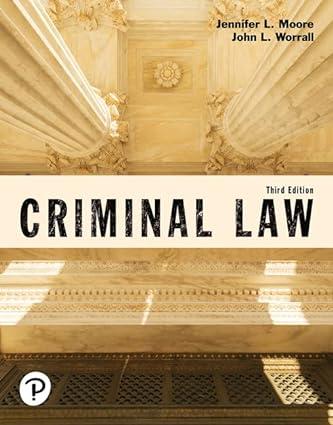The State of Florida sought an order quashing the trial courts determination that James was entitled to
Question:
The State of Florida sought an order quashing the trial court’s determination that James was entitled to utilize a “castle doctrine” defense at his trial for second degree murder. The Florida Court of Appeals granted the petition.
The State of Florida has brought this petition for issuance of a writ of certiorari seeking to quash an order of the trial court determining that the respondent/defendant, Alexander James, is entitled to utilize a “castle doctrine” defense and concomitant jury instruction at his upcoming trial for second degree murder. At issue is whether James, who was a social guest or visitor in the home of another at the time of his alleged commission of second degree murder, is entitled to the “castle doctrine” privilege and jury instruction. We conclude that he is not and for the reasons which follow, grant the petition and quash the circuit court’s order under review.
Respondent James had been acquainted with a woman named Semantha Beal for approximately one week before he came to her apartment on the morning of April 17, 1997 . . .
Shortly thereafter, the victim, Larry Ferguson, Beal’s allegedly abusive ex-boyfriend, showed up at Beal’s apartment . . .
[Ferguson] grabbed Beal and began to choke her. The respondent intervened to prevent the victim from hurting her . . . During the struggle between the respondent and the victim, a gun and the victim’s cellular telephone fell to the floor. The respondent picked up the gun and the victim fled into the bedroom . . . The respondent extended his right arm up in front of himself and fired a shot through the partially closed bedroom door. The bullet hit the victim in the chest at a downward angle. The victim died a few days later and the respondent was charged with second degree murder.
Both Florida statutory and common law permit the use of deadly force in self-defense if a person reasonably believes that such force is necessary to prevent imminent death or great bodily harm. Specifically, section 776.012, Florida Statutes (1995), provides that “a person . . . is justified in the use of deadly force only if he reasonably believes that such force is necessary to prevent imminent death or great bodily harm to himself or another or to prevent the imminent commission of a forcible felony.” Even under these circumstances, there is still a Florida common law duty to use every reasonable means to avoid the danger, including retreat, prior to using deadly force.
The “duty to retreat” rule has an exception, known as the
“castle doctrine,” which espouses that one is not required to retreat from one’s residence, or one’s “castle,” before using deadly force in self-defense, so long as the deadly force is necessary to prevent death or great bodily harm. Florida courts have defined the castle doctrine as a privilege one enjoys in one’s own dwelling place. The Florida Supreme Court has said:
when one is violently assaulted in his own house or immediately surrounding premises, he is not obliged to retreat but may stand his ground and use such force as prudence and caution would dictate as necessary to avoid death or great bodily harm.
When in his home he has “retreated to the wall.” . . . [A] man is under no duty to retreat when attacked in his own home. His home is his ultimate sanctuary.
The castle doctrine privilege of non-retreat is “equally available to all those lawfully residing in the premises, provided, of course, that the use of deadly force was necessary to prevent death or great bodily harm.” We have further extended the
“castle doctrine” privilege to employees in their place of employment, while lawfully engaged in their occupations . . .
The issue before us comes down to whether the castle doctrine privilege should be further extended to a temporary visitor or guest, since the respondent was not a resident of the apartment at the time of the alleged incident. We think that a further extension of the “castle doctrine” privilege to include a temporary social guest or visitor must be weighed against the underlying policy consideration of the “duty to retreat”
rule: “[h]uman life is precious, and deadly combat should be avoided if at all possible when imminent danger to oneself can be avoided.” We believe that an overly broad extension of the castle doctrine would vitiate the retreat rule. The more places there are where one has castle doctrine protection, the fewer places there would be from which one has a duty to retreat.
As the state insightfully observes, granting castle doctrine protection to a social guest or visitor would necessarily grant the guest or visitor innumerable castles wherever he or she is authorized to visit. That, in turn, would expand the privilege of non-retreat and encourage the use of deadly force. We agree and, therefore, decline to extend the “castle doctrine” privilege to a temporary social guest or visitor in the home of another . . .
Petition for certiorari granted and case is remanded for further proceedings consistent with this opinion.
Questions:-
1. Explain how and when the castle doctrine applies in Florida.
2. Did Mr. James have a duty to retreat?
Step by Step Answer:






